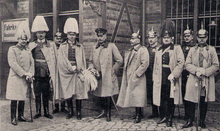Erich Weber (General)
Erich Paul Weber (born September 12, 1860 in Kamen ; † October 29, 1933 in Berlin ) was a German officer who was also used in the Ottoman Army during World War I and at the end of his military career achieved the rank of general of the infantry .
Life
Weber joined the Prussian Army and received his patent as a second lieutenant on April 15, 1878 . In the further course of his military career he was commander of the Schleswig-Holstein Pioneer Battalion No. 9 and was transferred to Metz on April 14, 1907 as a major in the 4th engineer inspection . Here he was deployed as an engineer officer from the place of the fortress area west and promoted to lieutenant colonel on March 22, 1910 . Appointed commander of the pioneers of the XV. Army Corps was transferred to Strasbourg on May 22, 1912 . In this position he wore the uniform of the 1st Alsatian Pioneer Battalion No. 15 and became a colonel on November 19, 1912 .
On December 8, 1913, Weber was put on the disposition with the statutory pension in approval of his resignation request and joined the Ottoman army as part of the German military mission under Liman von Sanders . Weber, who was considered a specialist in fortifications , began in the Ottoman Empire under Admiral von Usedom on behalf of the Ottoman Minister of War with the reinforcement of the coastal fortifications on the Dardanelles . During the Gallipoli campaign in 1915, he proved himself as a troop leader on the Asian side of the strait at Kum Kale and was honored for this by Sultan Mehmed V with the title of pasha . After a falling out with Liman von Sanders, Weber was replaced on July 8, 1915 as commander of the southern group.
Weber returned to Germany in October 1915, was re-employed in the army as a major general from April 18, 1915 and was in command of the 100th Infantry Brigade on the Western Front from October 22 to November 16, 1915 . On December 21, 1916 he took over the leadership of the 9th Division on the Western Front and kept this command until the Armistice of Compiègne .
After the end of the war, he was accepted into the provisional Reichswehr and on June 16, 1920 he was promoted to lieutenant general . As such he was commander of the military district command II. After the formation of the Reichswehr , he was appointed commander of the 2nd division in Stettin on October 1, 1920 . On June 15, 1921 he was given the character of General of the Infantry, after which he was retired.
The Bundeswehr barracks in Höxter is named after Weber .
His daughter Ingeborg had been married to the later Grand Admiral Karl Dönitz since 1916 .
Web links
Individual evidence
- ↑ a b Prussian War Ministry (ed.): Ranking list of officers of the Royal Prussian Army and the XIII. (Royal Württemberg Army Corps 1917. ES Mittler & Sohn , Berlin 1917, p. 6
- ^ Military weekly paper . No. 49 of April 16, 1907. p. 1130.
- ↑ Prussian War Ministry (ed.): Ranking list of the Royal Prussian Army and the XIII. (Royal Württemberg) Army Corps for 1911. ES Mittler & Sohn . Berlin 1911. p. 124.
- ^ Military weekly paper. No. 66 of May 24, 1912, p. 1496.
- ^ Reichsarchiv : Battles of the World War. Volume 16: The battle for the Dardanelles 1915. Gerhard Stalling publisher. Oldenburg 1927, p. 52.
- ^ Klaus Wolf: Gallipoli 1915. The German-Turkish military alliance in the First World War. Report Verlag, Bonn 2008, ISBN 978-3-932385-29-2 , p. 145.
- ↑ Dermot Bradley (Ed.), Günter Wegner: Occupation of the German Army 1815-1939. Volume 1: The higher command posts 1815-1939. Biblio Publishing House. Osnabrück 1990. ISBN 3-7648-1780-1 . P. 315.
- ↑ Reichswehr Ministry (Ed.): Occupation in the new army from May 16, 1920. Issue I. Reichsdruckerei , Berlin 1920, p. 8.
| personal data | |
|---|---|
| SURNAME | Weber, Erich |
| ALTERNATIVE NAMES | Weber, Erich Paul |
| BRIEF DESCRIPTION | German general of the infantry |
| DATE OF BIRTH | September 12, 1860 |
| PLACE OF BIRTH | Came |
| DATE OF DEATH | October 29, 1933 |
| Place of death | Berlin |
